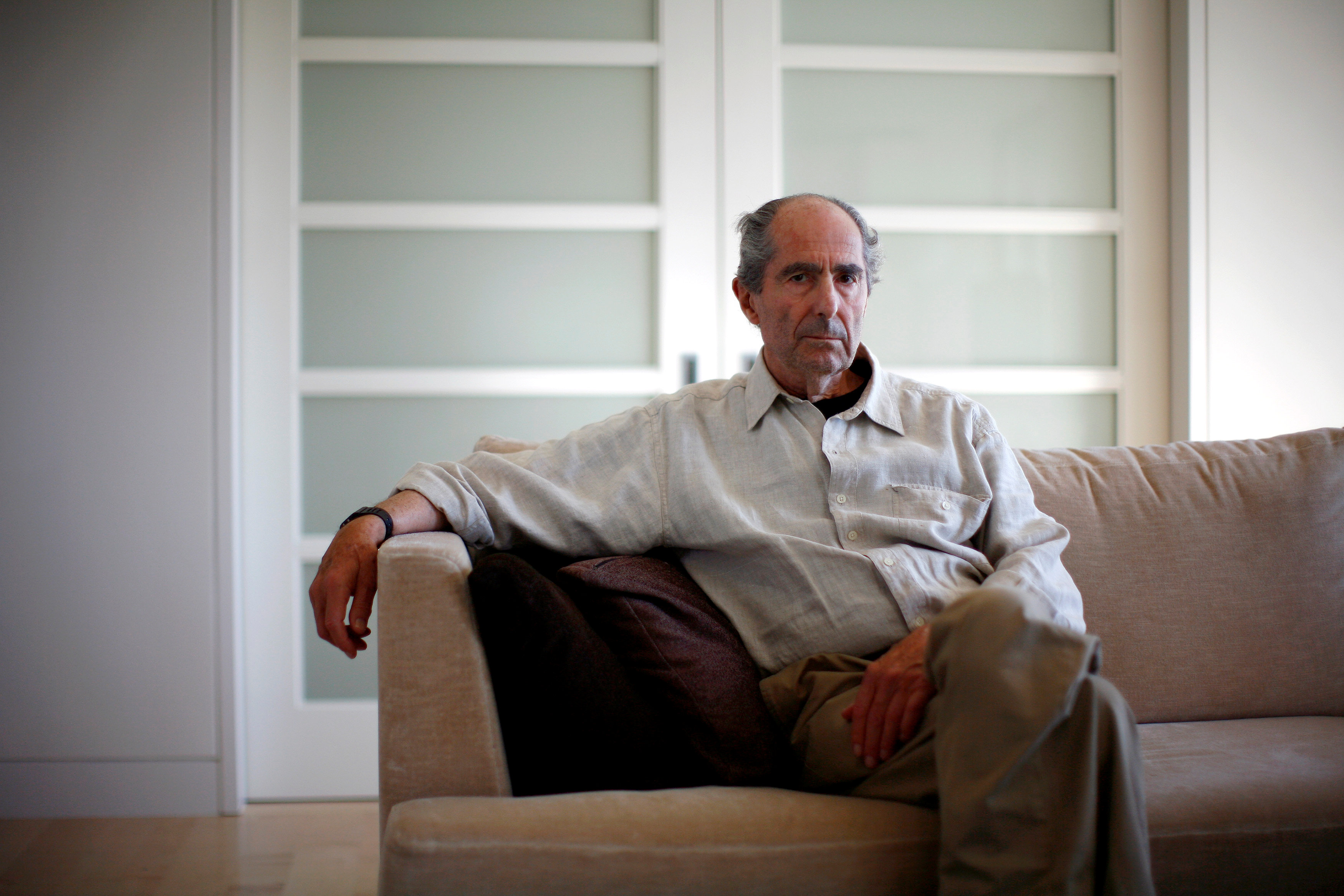
It was almost too much that Mel Brooks and Philip Roth were set to appear together in the same room. It was almost a relief that for their back-to-back press conferences promoting the PBS “American Masters” series, Roth was streamed via satellite into Pasadena’s ritzy Langham Hotel from his home in Newark, N.J., and Brooks was running “chronically late,” blaming L.A. traffic.
The legendary writer and the legendary entertainer couldn’t be more different. Roth is a shy, stern but sweet intellectual with bushy eyebrows and dark, penetrating eyes; Brooks is an effervescent crowd-pleaser, dapperly dressed and still, at 86, deprecating about his size: “I’m not such a comedy giant — I’m 5-foot-6,” he said.
They also couldn’t be more similar.
“I’m not crazy about seeing myself described as an American-Jewish writer,” Roth tells the camera in his “Masters” portrait, which will air on March 29, shortly after his 80th birthday. “I don’t write in Jewish. I write in American.”
“I think I missed the Jew boat by one generation,” Brooks said when asked if he considered himself a “Jewish entertainer.” “When I worked in the Borscht Belt, I spoke in English; a generation before me, they spoke in Yiddish.”
These two Jewish geniuses get asked about Jewishness a lot. Is it their Jewishness that makes them so special or their specialness that makes Jewishness matter?
“They keep asking me,” Brooks continued, “ ‘What is Jewish comedy? How does it differ from normal comedy?’ I say, ‘You got it wrong. It’s not really Jewish comedy — there are traces of it, but it is really New York comedy, urban comedy, street-corner comedy. It’s not Jewish comedy — that’s from Vilna, that’s Poland.”
I asked Roth why the Jewish label bothered him. “It doesn’t bother me,” he said. “People can call me anything they want.” Well, then, what role has it played?
“I’m an American writer. Think of Faulkner, think of Bellow — they’re regionalists. They write about the place that they come from. So was Joyce, a regionalist. I wrote about the region I came from, and that particular locale was full of Jews — me, my family and all my friends. So I wrote about them. The ‘Jewishness’ wasn’t so much Jewishness as these are the people I knew, and this is the culture I knew. In my adult life, I have had many friends from many different backgrounds, but by and large, I have followed the lives of Jewish men because I know the most about them — I think.”
I couldn’t help but wonder what he’d make of Brooks — what inner life he’d ascribe to the zany, jocular, extrovert who has a difficult time going deep. When I asked Brooks about his major struggles, he replied, “getting stuff made.” Turns out, his mega-hit movie “The Producers” (1968) was the hardest: “the highest mountain I ever had to climb,” Brooks said. “First of all, the title was ‘Springtime for Hitler,’ ” — that got a laugh — “and it got to Lew Wasserman at Universal, and he liked it. He said, ‘I’ll do it — but not with Hitler. How about Mussolini? He’s more likable.’ I said, ‘Well, you don’t really get it …’ ”
When the subject of Brooks’ late wife, actress Anne Bancroft, came up, he welled up with tears, his voice tremulous. “I can’t,” he said. “It’s a little too painful and private” — though he mustered composure for one anecdote about her learning Polish to sing “Sweet Georgia Brown” with him in the 1983 film “To Be or Not to Be.” “I was very lucky for 45 years,” he said, “and it is very difficult everyday to go on without her.”
Roth was even more reticent in sharing his heart. I asked him about the great loves of his life, expecting he might say “writing,” or even “fly fishing.”
“Do you want names?” he quipped. Everybody laughed. “I’ve loved quite a few people. And I think I’ve been loved back. And it’s great while it lasts.
Roth was more forthcoming on the subject of struggle and how difficult it is for him to write. The topic has become an item of recent fascination, ever since Roth announced his plans to retire to The New York Times last November, allowing a reporter to glimpse the now infamous sticky note at his computer that reads, “The struggle with writing is over.” In reality, no one was more surprised by Roth’s retirement than Roth himself, who said that long before the Times caught wind of it, a French journalist, writing for an obscure publication, asked about his next book and he replied, “I think it’s over; I think I’m finished.” He was astonished by the Times’ front-page splash, suggesting, “Somebody must have gone to a barber shop one day and seen the [English translation of the French] article.”
“I don’t know where to go after I’ve finished a book,” he said. “I feel barren.” What begins with “a character in a predicament” becomes a task of producing “a whole world, a world of language [and] that’s a labor. It’s laborious to come up with the fullness, the richness of the thing. You build a book out of sentences, and sentences are built of details, and you’re working brick by brick to make a structure, and the bricks are heavy!
But what if you find another character in a predicament, someone asked.
“I don’t want to find it anymore. I’m tired,” he replied.
Brooks, on the other hand, is seemingly tireless. He is currently developing “Blazing Saddles” as a stage musical, and even after an hour-long Q-and-A session, he didn’t want to stop:
“Are there any other questions from any other Jews here?”






















 More news and opinions than at a Shabbat dinner, right in your inbox.
More news and opinions than at a Shabbat dinner, right in your inbox.